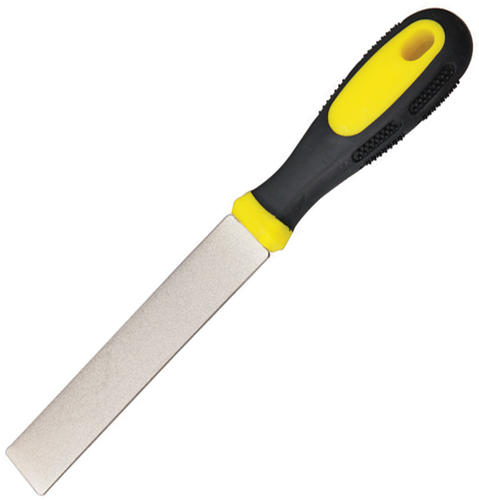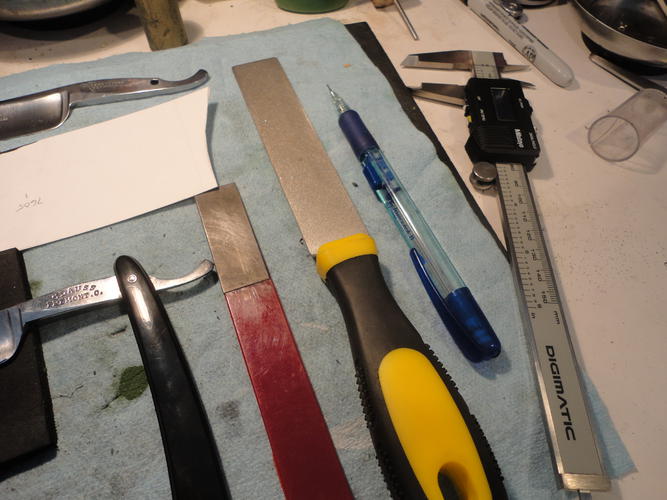Results 11 to 16 of 16
-
03-15-2016, 03:59 AM #11
-
03-16-2016, 01:17 AM #12Senior Member



- Join Date
- Apr 2012
- Location
- Diamond Bar, CA
- Posts
- 6,553
Thanked: 3215
So, first clean the blade at least with some WD 40 and 000 or 0000 steel wool being careful to work around the gold wash, if you intend to keep it. A small piece of steel wool folded over the tip of a coffee stir stick clipped straight will give you control and allow you to get into tight spots.
Polish with a small piece of 1k wet and dry and a good metal polish taking care of the wash or tape the wash as recommended.
Then bread knife and re-shape the heel as Glenn demonstrated in the video. If you don’t clean the razor first, all that rust will end up on your strop.
When you have to remove a chip, which technique you use does not matter. You will remove exactly the same amount of material, to just past the bottom of the chip. What matters is how much control you have, over the material removal. Bread-knifing gives you the most control, especially if you flip the razor on the spine and use a Diamond file or plate so you can see exactly what you are doing.
The small chip near the toe will come out with a regular honing on the 1k. it should not require bread knifing, unless you have other damage not shown in the photos.
-
03-16-2016, 07:27 AM #13Senior Member

- Join Date
- Sep 2014
- Location
- Bulgaria
- Posts
- 840
Thanked: 168
You can laugth at me but i use a coticule slurry or Jnat slurry for restoration
If the rust and pitings are light take a piece og coton cloth or one of those small things that woman use to cleat theyre faces from the nake up .Make heavy slury wuth the coticule and i mean heavy and thick as cream and put it on the blade Make hure you dull it well before that - remove entirely the edge on a 1 k stone , not DMT Usualy this gives a fresh start to avoid chipings
rub with the cloth or directly with a small coti stone on the blade until it shines and after use some crox or thury slury to polosh it
aways use oil after usage of a rasor and good drying
-
03-16-2016, 05:05 PM #14Senior Member



- Join Date
- Apr 2012
- Location
- Diamond Bar, CA
- Posts
- 6,553
Thanked: 3215
That is a good point that is never really discussed, I always remove the edge on any razor that I work on. Especially for restoration and buffing, I run a 1k diamond file on the edge and completely dull it, just one or two strokes will do it.
As said a 1k or small Washita will do the same, most have small chips that need to be removed anyway.
You are going to re-hone it, but it is so much safer to work on without an edge.
-
03-16-2016, 05:42 PM #15Senior Member



- Join Date
- Apr 2012
- Location
- Diamond Bar, CA
- Posts
- 6,553
Thanked: 3215
This is an excellent file for restore work, I got mine from a tool guy at a local swapmeet, but have seen them on EBay for about $10. EZ-Lap carries them for about 14 bucks.
It is 400 / 1k dual grit, on inch wide and great for reshaping heels. I have seen them marketed as 400/600 and 400/1k, does not matter they work great. I use the fine side to remove an edge with one light swipe.
The small red one is also an EZ-Lap file, that are sold individually and in sets. The larger one I picked up about 6 months ago and like it better for the width and dual grit.
Here is a link to an EZ-lap vendor.


-
03-16-2016, 06:06 PM #16At this point in time...




- Join Date
- Jun 2007
- Location
- North Idaho Redoubt
- Posts
- 27,037
- Blog Entries
- 1
Thanked: 13249
Another point that is rarely discussed:
When dealing with chips like that in Extreme Hollow grind by doing a High Angle repair 45° instead of Breadknifing it 90° you risk running the chip into a crack should you flex the blade..
Back by the heel stabilizer is probably safe but the risk is always there and becomes higher the more hollow the blade..
Breadknife 90° the chip almost fully out, then adjust the angle down 60° 45° 30° as it gets safer and finally touch down with the spine on the stone
Or just go for it and learn for yourself


 12Likes
12Likes LinkBack URL
LinkBack URL About LinkBacks
About LinkBacks







 Reply With Quote
Reply With Quote